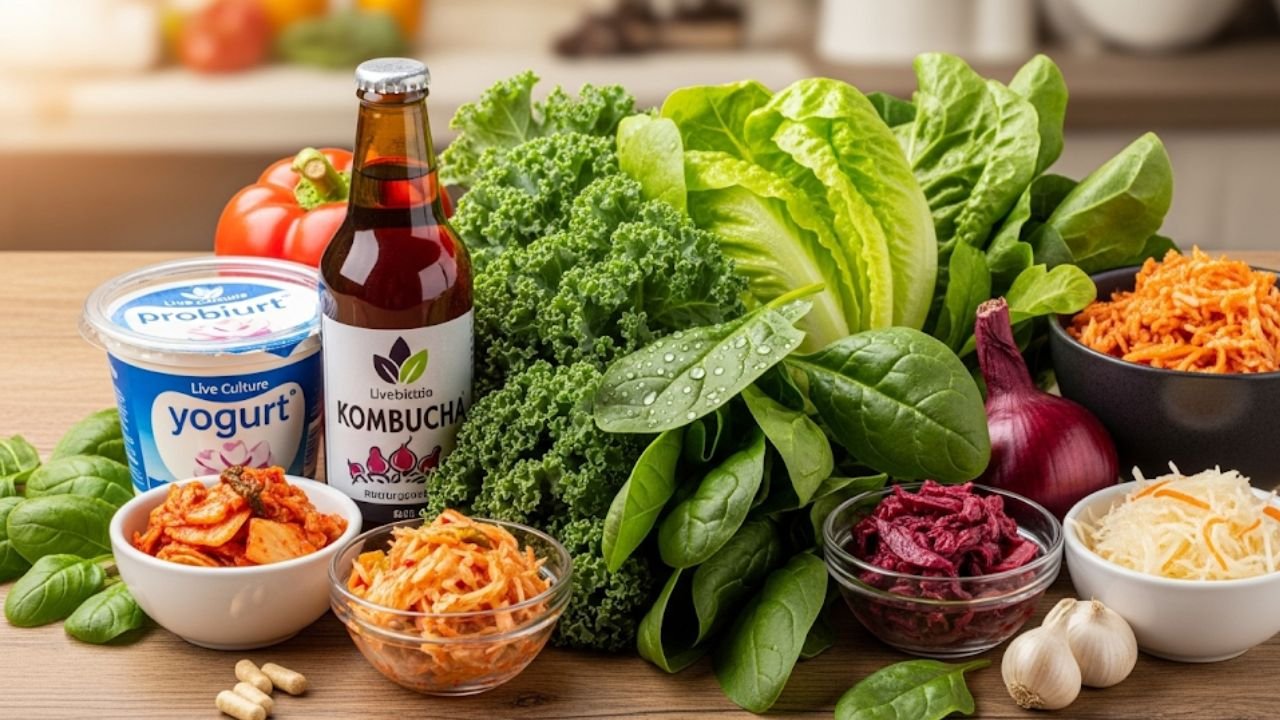5 Natural Ways to Boost Gut Health

Ever felt butterflies in your stomach before a big event? Or had a “gut feeling” that turned out to be right? That’s not just coincidence—your gut and brain are constantly talking. The gut, often called the second brain, is at the heart of how you feel, think, and function. And trust me, when your gut isn’t happy, everything else feels off.
I used to think of gut health as something only health nuts cared about. But after struggling with bloating, low energy, and brain fog for months, I learned firsthand how much the gut affects our entire well-being. When I started making small, natural changes, everything shifted. My skin cleared up, I had more energy, and I felt lighter—physically and emotionally.
In this guide, I’ll share 5 natural ways to boost gut health, all backed by both science and lived experience. Let’s dive in.
1. Feed Your Gut with Fermented Foods
If your gut were a garden, fermented foods would be the compost—rich, alive, and full of goodness. These foods are packed with probiotics, which are beneficial bacteria that help balance your gut microbiome.
Fermented foods like yogurt, kefir, sauerkraut, kimchi, and miso are not only delicious but also powerful healers. Think of them as your gut’s best friends. They help break down food better, support your immune system, and even lift your mood. There’s real joy in knowing that with every spoonful of sauerkraut or sip of kombucha, you’re doing something kind for your insides.
When I first added kimchi to my meals, I’ll admit—I was skeptical. It was spicy, tangy, and weird. But after a week, my digestion improved noticeably. No more bloating after meals, and my cravings for sugar decreased.
Quick Tip: Start slow—too much fermented food too quickly can cause gas. Begin with a tablespoon a day and listen to your body.
Why It Works:
-
Adds good bacteria to your gut.
-
Enhances digestion and nutrient absorption.
-
Supports immune and brain health.
| Fermented Food | Probiotic Strains | Serving Suggestion |
|---|---|---|
| Yogurt (with live cultures) | Lactobacillus, Bifidobacterium | Eat as a snack or breakfast |
| Kimchi | Lactobacillus plantarum | Add to rice bowls or stir-fries |
| Sauerkraut | Lactobacillus brevis | Top sandwiches or salads |
| Kefir | Over 30 strains! | Drink on its own or add to smoothies |
| Miso | Aspergillus oryzae (a beneficial fungus) | Stir into warm water for a soup |
2. Fiber: Your Gut’s Favorite Fuel
Fiber isn’t glamorous. You won’t see it trending on social media, but your gut loves it. Dietary fiber acts like a broom, gently sweeping your digestive system clean while also feeding the good bacteria in your gut.
There are two types of fiber: soluble (which becomes gel-like in your gut and slows digestion) and insoluble (which adds bulk and keeps things moving). Together, they create the perfect environment for a thriving gut microbiome.
I didn’t grow up eating a lot of fiber. In fact, I thought fiber was just something you took when you were constipated. But adding more plant-based foods—like lentils, apples, oats, and chia seeds—made a huge difference. My energy became more stable, and I stopped feeling sluggish after meals.
Simple Ways to Add More Fiber:
-
Sprinkle chia or flax seeds on yogurt or oatmeal.
-
Swap white bread for whole grain.
-
Add lentils or beans to soups and salads.
Benefits of Fiber for Gut Health:
-
Nourishes good bacteria (prebiotics).
-
Supports regular bowel movements.
-
Reduces inflammation and risk of gut-related diseases.
3. Stay Hydrated to Keep Things Flowing
Water may seem basic, but it’s essential for gut health. Picture your digestive system like a lazy river—it needs enough water to keep things flowing. Without it, everything slows down, and you can feel backed up and bloated.
Hydration helps break down food, absorb nutrients, and transport waste out of the body. If you’re eating more fiber (which you should be!), you need more water to help it move efficiently.
Personally, once I started carrying a water bottle everywhere, I noticed fewer cravings and more consistent digestion. And it doesn’t have to be just plain water—herbal teas, cucumber water, or lemon water can be refreshing alternatives.
Hydration Hacks:
-
Drink a glass of water before every meal.
-
Infuse water with fruits or herbs for flavor.
-
Keep a water tracker app or use a marked bottle.
How Water Supports Gut Health:
-
Prevents constipation.
-
Helps fiber do its job effectively.
-
Supports mucosal lining of intestines.
4. Stress Less—Your Gut Feels It Too
Have you ever had a stomachache from stress? That’s not in your head—it’s in your gut. Chronic stress can mess with your digestion, alter your gut bacteria, and even increase inflammation.
The gut and brain are connected through the gut-brain axis, like a superhighway of signals. When you’re anxious, your gut knows it. And when your gut is off, your brain feels it too—hello, brain fog and mood swings.
I remember a time when I was juggling work, family, and trying to stay healthy. My digestion went haywire. I wasn’t eating differently, but I was stressed. Adding in just 10 minutes of deep breathing and gentle walks each day calmed both my mind and gut.
Natural Ways to Reduce Stress:
-
Practice mindful breathing or meditation.
-
Do gentle yoga or stretching.
-
Get outside—sunlight and nature are natural mood boosters.
Why It Matters:
-
Reduces gut inflammation.
-
Balances cortisol and gut bacteria.
-
Improves sleep, which also affects gut health.
5. Sleep: The Overlooked Gut Healer
Sleep and gut health are like two best friends—they support each other silently but powerfully. When you sleep well, your gut has time to repair and reset. When you don’t, it struggles to keep the good bacteria thriving.
Research shows that poor sleep can disrupt your gut microbiome in as little as two nights. Think about that! A single weekend of bad sleep can throw off your whole digestive system.
For me, fixing my sleep was the final piece of the puzzle. I started a wind-down routine—turning off screens, sipping chamomile tea, and listening to calming music. Slowly, my sleep improved, and so did my digestion. No more waking up bloated or tired.
Tips for Better Sleep (and a Better Gut):
-
Keep your room cool and dark.
-
Go to bed and wake up at the same time daily.
-
Avoid heavy meals and caffeine at night.
Sleep and Gut Health:
-
Rest helps gut lining repair itself.
-
Boosts beneficial bacteria.
-
Improves overall digestion and energy levels.
Final Thoughts: Listen to Your Gut, It’s Talking to You
Your gut isn’t just where food gets processed—it’s where you get processed. Your emotions, your energy, your immune system—it all starts here. And the best part? You don’t need expensive supplements or extreme diets to heal it. Just small, loving steps.
If I can leave you with anything, it’s this: take care of your gut like you would a dear friend. Feed it well, listen to it, and give it rest. The more you tune in, the more you’ll feel the difference—not just in your digestion but in your entire life.
